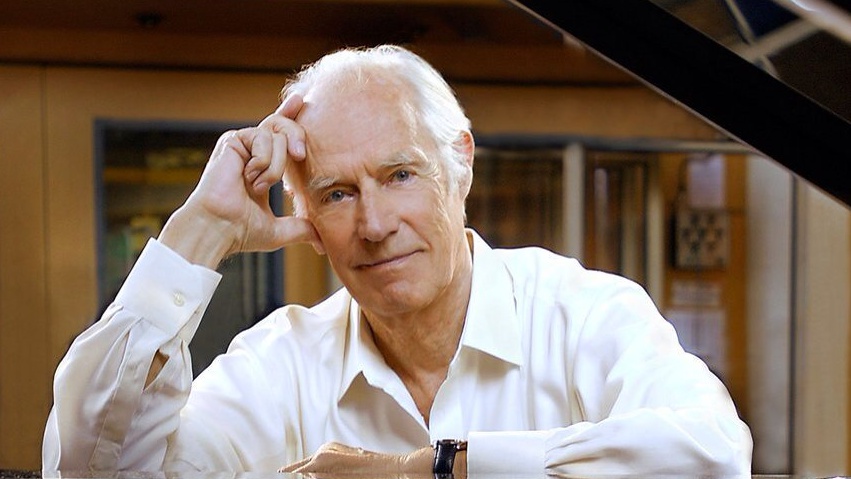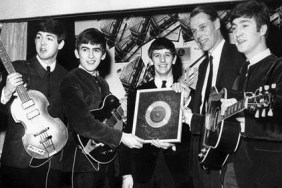Today, the world said goodbye to a true musical legend.
It’s no exaggeration to declare that without the talents of George Martin, not only would we have never heard of The Beatles, popular music as we know it (and have known it over the past 50+ years) would be very, very different.
Not only did Sir George have a hand in creating some of the most iconic songs ever written, his work with The Beatles went on to influence generations of equally iconic artists from Black Sabbath, Led Zeppelin, Queen, KISS, AC/DC, Nirvana, Oasis, Radiohead and Soundgarden to Foo Fighters, Tame Impala, Mark Ronson, Kanye West and even Justin freaking Bieber.
Thank you Sir George Martin: the greatest British record producer of all time. We will never stop living in the world you helped create.
— Mark Ronson (@MarkRonson) March 9, 2016
The contribution that this soft-spoken British gent made to popular music can not be emphasised enough. And as tributes continue to flood in across social media for The Fifth Beatle, we thought we’d honour a small part of Sir George’s huge legacy by remembering a handful of the incredible and iconic songs he helped create, and which have had an unmeasurable impact on all of our lives.
RIP to a true musical genius.
Elton John – Candle In The Wind (Princess Diana Version)
In 1997, following the tragic death of Princess Diana, Sir George re-recorded Elton John’s ode to Marilyn Monroe Candle In The Wind with updated lyrics honouring the People’s Princess. It remains the 2nd best-selling single in music history.
The Beatles – Sgt. Pepper’s Lonely Hearts Club Band
Not only did Sir George work tirelessly helping The Beatles experiment with loops, tape speeds, backwards recording and editing techniques to create the psychedelic masterpiece that is the album Sgt. Pepper’s Lonely Lonely Hearts Club Band, he also wrote almost all of the string and horn arrangements featured not just in the disc’s iconic title track, but on all of their music bar the Let It Be album.
During production on the Sgt. Pepper LP, he also linked two 4-track recorders together in a bid to better capture all of the complex sounds the songs required. That’s right, old mate invented the world’s first ever 8-track.
https://www.youtube.com/watch?v=2B2GB0WmikM
The Beatles – A Day In The Life
As the UK’s Telegraph points out, with The Beatles’ Sgt. Pepper album, Martin also effectively turned the recording process into a true art form. And that achievement is probably best summed up by the “tremendous build-up of expanding sound” that he created at the end of single A Day in the Life. To quote the Tele:
“It was Martin who scored that for the orchestra, gradually proceeding over 24 bars from the lowest note to the highest for each instrument, and he who instructed the musicians — radically — not to listen to their neighbours while playing the piece. It was also Martin who determined the crashing piano chords with which the song ends, and who synchronised the four Beatles and himself as they pounded them out simultaneously on three pianos, an upright and a grand in the Abbey Road studios.”
Shirley Bassey – Goldfinger (James Bond Theme)
As well as his work as a producer and arranger, Martin was also a prolific film composer. He wrote the score for The Beatles’ A Hard Day’s Night, Help! and the trippy-ass Yellow Submarine film and worked on the music for multiple James Bond movies. In fact, George was such a big James Bond fan that he even produced two of the franchise’s theme songs: his old pal Paul McCartney’s Live And Let Die and Shirley Bassey’s Goldfinger.
Martin. George Martin.
Little River Band – The Night Owls
Sir George shacked up with Melbourne’s own Little River Band in 1981 to work on their single The Night Owls. The Time Exposure track benefited from his lushly layered chorus harmonies and earned the Aussie group their first US top ten smash.
The Beatles – Strawberry Fields Forever
Many producers still view The Beatles’ Strawberry Fields Forever as a revolutionary achievement, and it remains one of the most defining songs of the psych-rock genre, continuing to influence modern bands like Australia’s own Tame Impala. Martin helped The Beatles achieve this result by experimenting with a number of breakthrough recording techniques on the Magical Mystery Tour track, including reverse-recorded instrumentation and tape loops.
The finished product was created after Martin edited together two separate versions of the song – each with a different tempo, mood and key.
Cheap Trick – Stop This Game
Sir George hooked up with Cheap Trick for their fifth studio album All Shook Up, which proved to be one of the band’s most distinctive and experimental efforts. It featured the hit single Stop This Game, which features a trademark droning piano intro (Martin’s subtle nod to his work on the Fab Four’s A Day In The Life).
The Beatles – Please Please Me
Proof that Sir George had a huge impact on crafting The Beatles’ sound from the outset, we have him to thank for speeding up their breakthrough single Please Please Me, which was originally a slow ballad, and introducing Lennon’s iconic harmonica part.
As legend has it, after recording wrapped, Martin looked over the mixing desk and said: “Gentlemen, you have just made your first number one record”.
The Beatles – I Feel Fine
Martin was largely responsible for the first incidence of guitar feedback to ever occur in a major pop recording with 1964’s I Feel Fine. As the story goes, John Lennon accidentally leaned his Gibson semi-electric guitar against a studio wall, and the A-string suddenly began to feeding back through his amp with a piercing shriek. The band were intrigued by the sound, and Martin recorded it at the start of I Feel Fine, in a move that would influence generations of garage rock bands for decades to come.
Jeff Beck – Diamond Dust
Jeff Beck was one of Martin’s main collaborators outside of his work with The Beatles. Among other projects, Sir George produced the guitarist’s 1975 LP Blow By Blow, which shows off the incredibly versatile talents of both men.
Not only is the disc itself a genre-blending masterpiece, assembling funk (You Know What I Mean), fusion (Air Blower), reggae (She’s a Woman) and balladry (Cause We’ve Ended As Lovers), as Ultimate Classic Rock points out, modern day guitar wizards like Joe Satriani owe their entire careers to the atmospheric guitar piece Diamond Dust, which is backed by Martin-arranged strings.
The Beatles – Yesterday
Drawing on his background in classical music, Martin also convinced Paul McCartney to add strings The Beatles’ classic ballad Yesterday, despite Macca’s initial reluctance.
https://www.youtube.com/watch?v=rRen3jDqViI
Gerry & The Pacemakers – You’ll Never Walk Alone
During the 1960’s, Sir George also collaborated with The Beatles’ fellow Liverpudlian band Gerry & The Pacemakers. Their 1963 single You’ll Never Walk Alone went on to become the official anthem of Liverpool FC, and can be heard being belted out by Reds fans to this day.
Tributes to Sir George Martin have been flowing in thick and fast from across the music world and beyond since news broke of his death.
See what some of the world’s biggest musicians, actors, politicians and more are saying about the departed musical genius below.
Sir George Martin. Gentleman and legend. R.I.P.
— Boy George (@BoyGeorge) March 9, 2016
Thank you Sir George Martin: the greatest British record producer of all time. We will never stop living in the world you helped create.
— Mark Ronson (@MarkRonson) March 9, 2016
Sir George Martin was a giant of music – working with the Fab Four to create the world's most enduring pop music.
— David Cameron (@David_Cameron) March 9, 2016
https://twitter.com/RobSchneider/status/707450017196457984
The legends are really going home! Visionary producer of #TheBeatles, George Martin (1926-2016). pic.twitter.com/X8sVf9iNQ7
— Lenny Kravitz (@LennyKravitz) March 9, 2016
Every time I record at abbey road I geek out and play with the mics sir George Martin used. What an ear, what a life, what a legacy.
— josh groban (@joshgroban) March 9, 2016
I'm gutted. The best producer of all time has passed on. I owe you everything Sir George Martin.… https://t.co/KzDTbz5NKw
— John Feldmann (@JohnFeldy) March 9, 2016
Sir George Martin RIP LG x
— Liam Gallagher (@liamgallagher) March 9, 2016
https://twitter.com/flea333/status/707435817644498944






















